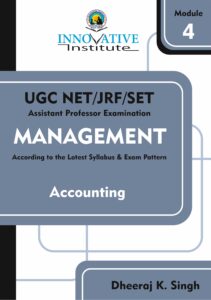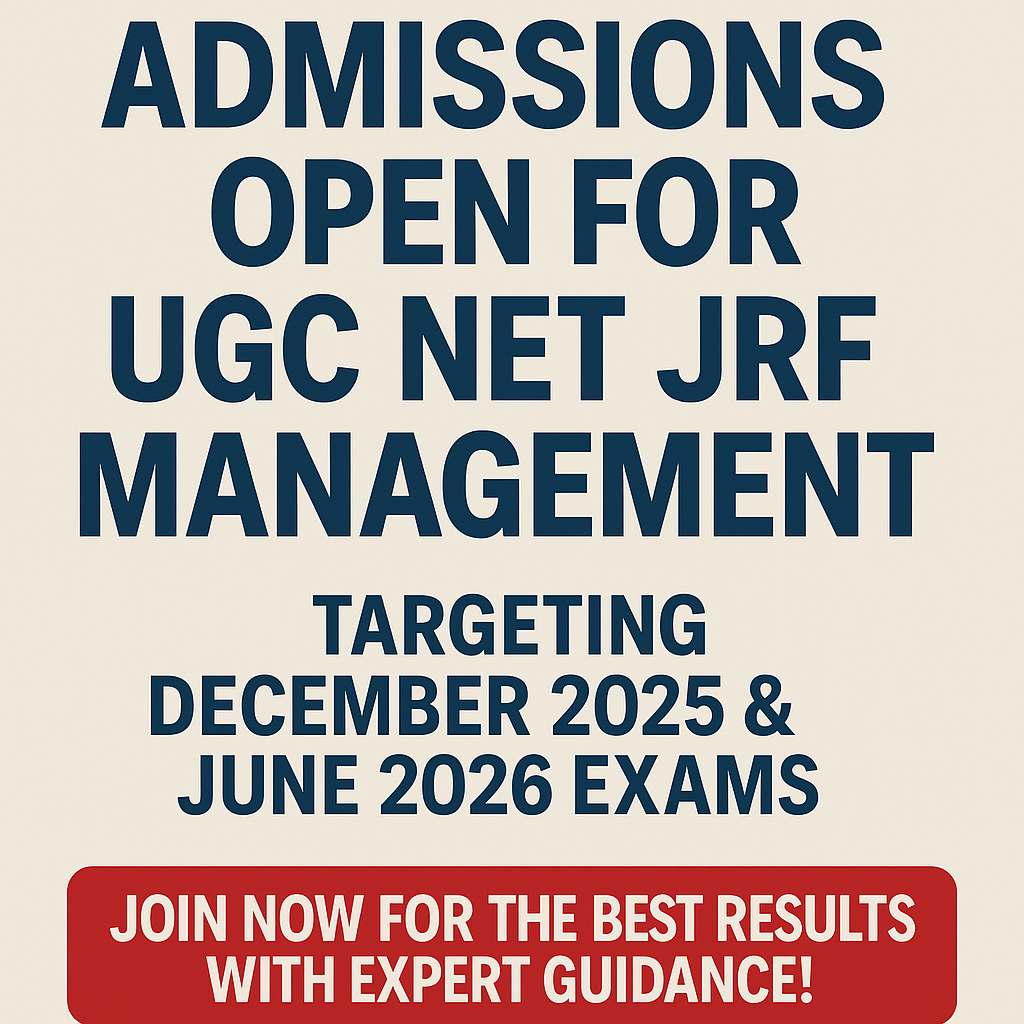India’s Best Coaching for UGC- NET JRF Management
“We offer UGC NET JRF Management coaching with comprehensive study materials, meticulously prepared by our in-house team of subject experts, including a large number of MCQs.
Crack under the guidance of our star faculties –
Daniel Sir
and
Dheeraj Sir
“Join Innovative Institute for UGC NET Management classes and boost your preparation for the CBSE NET JRF entrance exam. We provide expert-led coaching with access to comprehensive study material, including topic-wise notes, a wide range of MCQs, previous year papers, and the latest syllabus. Our resources are designed by experienced subject experts to help you master core management concepts and improve exam performance. Whether you’re targeting the December or June cycle, our structured classes and updated content ensure complete coverage of the UGC NET Management syllabus. Get the best books, strategic guidance, and regular practice tests—all in one place. Start your journey towards qualifying NET JRF with confidence and the right support.”
“Admissions Open for UGC NET JRF Management – Targeting December 2025 & June 2026 Exams. Join Now for the Best Results with Expert Guidance!”
Subject : Management
Code No. : 17
It is notified that National Testing Agency (NTA) will conduct the coming UGC-NET JRF Examination for Junior Research Fellowship & Assistant Professor. As per the revised scheme of examination , the test will consist of two papers, as below, on online mode:
| Paper | Marks | No.of Questions | Duration |
|---|---|---|---|
| I | 100 | 50 questions. All are compulsory | 1 Hour |
| II | 200 | 100 questions. All are compulsory | 2 Hours |
Scheme of Examination
Paper-I shall consist of 50 objective type compulsory questions each carrying 2 marks. The questions which will be of general nature, intended to assess the teaching/research aptitude of the candidate. It will primarily be designed to test reasoning ability, comprehension,divergent thinking and general awareness of the candidate
Paper-II shall consist of 100 objective type compulsory questions each carrying 2 marks. Objectives Type Question consists Multiple choice, Matching Type, True / false, Ascertain-Reasoning type etc.
Procedure and Criteria for Declaration of Result
Step I: Minimum marks to be obtained in NET for considering a candidate for the award of JRF and eligibility for Assistant Professor.
The candidates are required to obtain minimum marks separately in Paper-I, Paper-II and Paper –III as given below:
| CATEGORY | Minimum Marks (%) to be obtained | ||
| PAPER – I | PAPER – II | ||
| GENERAL | 40% aggregate marks in all the three papers taken together | ||
| OBC (Non-creamy layer) PWD/SC/ST | 35% aggregate marks in all the three papers taken together | ||
Don’t rely on the insufficient material available in the market Join our Classroom Programme for Best Results
Syllabus: PAPER – II – Management
Module 1 : Business Management ; Managerial Economics & Business Ethics
Part A: Business Management
Unit – I
Management – Concept, Process, Theories and Approaches, Management Roles and Skills
Functions – Planning, Organizing, Staffing, Coordinating and Controlling.
Communication – Types, Process and Barriers.
Decision Making – Concept, Process, Techniques and Tools
Organisation Structure and Design – Types, Authority, Responsibility, Centralisation, Decentralisation and Span of Control
Part B: Managerial Economics
Unit–I
Managerial Economics – Concept & Importance
Demand analysis – Utility Analysis, Indifference Curve, Elasticity & Forecasting
Market Structures – Market Classification & Price Determination
National Income – Concept, Types and Measurement
Inflation – Concept, Types and Measurement
Part C: Business Ethics
Unit–I
Business Ethics & CSR
Ethical Issues & Dilemma
Corporate Governance
Value Based Organisation
Module 2: Organisational Behaviour
Unit–II
Organisational Behaviour – Significance & Theories
Individual Behaviour – Personality, Perception, Values, Attitude, Learning and Motivation
Group Behaviour – Team Building, Leadership, Group Dynamics
Interpersonal Behaviour & Transactional Analysis
Organizational Culture & Climate
Work Force Diversity & Cross Culture Organisational Behaviour
Emotions and Stress Management
Organisational Justice and Whistle Blowing
Module 3: Human Resource Management
Unit–II
Human Resource Management – Concept, Perspectives, Influences and Recent Trends
Human Resource Planning, Recruitment and Selection, Induction, Training and Development
Job Analysis, Job Evaluation and Compensation Management
Unit–III
Strategic Role of Human Resource Management
Competency Mapping & Balanced Scoreboard
Career Planning and Development
Performance Management and Appraisal
Organization Development, Change & OD Interventions
Talent Management & Skill Development
Employee Engagement & Work Life Balance
Industrial Relations: Disputes & Grievance Management, Labour Welfare and Social Security
Trade Union & Collective Bargaining
International Human Resource Management – HR Challenge of International Business
Green HRM
Module 4: Accounting
Unit-IV
Accounting Principles and Standards, Preparation of Financial Statements
Financial Statement Analysis – Ratio Analysis, Funds Flow and Cash Flow Analysis, DuPont Analysis
Preparation of Cost Sheet, Marginal Costing, Cost Volume Profit Analysis
Standard Costing & Variance Analysis
Unit-V
Budgeting and Budgetary Control, Types and Process, Zero base Budgeting
Mergers and Acquisition – Corporate Restructuring, Value Creation, Merger Negotiations, Leveraged Buyouts, Takeover
Module 5: Financial Management
Unit-IV
Financial Management, Concept & Functions
Capital Structure – Theories, Cost of Capital, Sources and Finance
Leverages – Operating, Financial and Combined
Leverages, EBIT–EPS Analysis, Financial Breakeven Point & Indifference Level.
Unit-V
Value & Returns – Time Preference for Money, Valuation of Bonds and Shares, Risk and Returns;
Capital Budgeting – Nature of Investment, Evaluation, Comparison of Methods; Risk and Uncertainly Analysis
Dividend – Theories and Determination
Mergers and Acquisition – Corporate Restructuring, Value Creation, Merger Negotiations, Leveraged Buyouts, Takeover
Portfolio Management – CAPM, APT
Derivatives – Options, Option Payoffs, Option Pricing, Forward Contracts & Future Contracts
Working Capital Management – Determinants, Cash, Inventory, Receivables and Payables Management, Factoring
International Financial Management, Foreign exchange market
Module 6: Strategic Management
Unit–VI
Strategic Management – Concept, Process, Decision & Types
Strategic Analysis – External Analysis, PEST, Porter’s Approach to industry analysis, Internal Analysis – Resource Based Approach, Value Chain Analysis
Strategy Formulation – SWOT Analysis, Corporate Strategy – Growth, Stability, Retrenchment, Integration and Diversification, Business Portfolio Analysis – BCG, GE Business Model, Ansoff’s Product Market Growth Matrix
Strategy Implementation – Challenges of Change, Developing Programs Mckinsey 7s Framework
Module 7: Marketing Management
Unit-VI
Marketing – Concept, Orientation, Trends and Tasks, Customer Value and Satisfaction
Market Segmentation, Positioning and Targeting
Product and Pricing Decision – Product Mix, Product Life Cycle, New Product development,
Pricing – Types and Strategies
Place and promotion decision – Marketing channels and value networks, VMS, IMC, Advertising and Sales promotion
Unit–VII
Consumer and Industrial Buying Behaviour: Theories and Models of Consumer Behaviour
Brand Management – Role of Brands, Brand Equity, Equity Models, Developing a Branding Strategy; Brand Name Decisions, Brand Extensions and Loyalty
Logistics and Supply Chain Management, Drivers, Value creation, Supply Chain Design, Designing and Managing Sales Force, Personal Selling
Service Marketing – Managing Service Quality and Brands, Marketing Strategies of Service Firms
Customer Relationship Marketing – Relationship Building, Strategies, Values and Process
Retail Marketing – Recent Trends in India, Types of Retail Outlets.
Emerging Trends in Marketing – Concept of e-Marketing, Direct Marketing, Digital Marketing and Green Marketing
International Marketing – Entry Mode Decisions, Planning Marketing Mix for International Markets
Module 8: Statistics for Management & Operations Management
Part A: Statistics for Management
Unit-VIII
Statistics for Management: Concept, Measures Of Central Tendency and Dispersion, Probability Distribution – Binominal, Poison, Normal and Exponential
Data Collection & Questionnaire Design
Sampling – Concept, Process and Techniques
Hypothesis Testing – Procedure; T, Z, F, Chi-square tests
Correlation and Regression Analysis
Part B: Operations Management
Unit-VIII
Operations Management – Role and Scope
Facility Location and Layout – Site Selection and Analysis,
Layout – Design and Process
Enterprise Resource Planning – ERP Modules, ERP implementation
Scheduling; Loading, Sequencing and Monitoring
Quality Management and Statistical Quality Control, Quality Circles, Total Quality Management – KAIZEN, Benchmarking, Six Sigma; ISO 9000 Series Standards
Operation Research – Transportation, Queuing, Decision Theory, PERT / CPM
Module 9: International Business & Information Technology
Part A: International Business
Unit–IX
International Business – Managing Business in Globalization Era; Theories of International Trade; Balance of payment
Foreign Direct Investment – Benefits and Costs
Multilateral regulation of Trade and Investment under WTO
International Trade Procedures and Documentation; EXIM Policies
Role of International Financial Institutions – IMF and World Bank
Part B: Information Technology
Unit-IX
Information Technology – Use of Computers in Management Applications; MIS, DSS
Artificial Intelligence and Big Data
Data Warehousing, Data Mining and Knowledge Management – Concepts
Managing Technological Change
Module 10: Entrepreneurship Development
Unit–X
Entrepreneurship Development – Concept, Types, Theories and Process, Developing Entrepreneurial Competencies
Intrapreneurship – Concept and Process
Women Entrepreneurship and Rural Entrepreneurship
Innovations in Business – Types of Innovations, Creating and Identifying Opportunities, Screening of Business Ideas
Business Plan and Feasibility Analysis – Concept and Process of Technical, Market and Financial Analysis
Micro and Small Scale Industries in India; Role of Government in Promoting SSI
Sickness in Small Industries – Reasons and Rehabilitation
Institutional Finance to Small Industries – Financial Institutions, Commercial Banks, Cooperative Banks, Micro Finance.
UGC NET JRF Management Syllabus : Pdf
Question Paper Bifurcation
UGC NET JRF Management Examination
| Unit | Paper Name | ||
|---|---|---|---|
| 1 | Business Management ; Managerial Economics & Business Ethics | ||
| 2 | Organisational Behaviour | ||
| 3 | Human Resource Management | ||
| 4 | Accounting | ||
| 5 | Financial Management | ||
| 6 | Strategic Management | ||
| 7 | Marketing Management | ||
| 8 | Statistics for Management & Operations Management | ||
| 9 | International Business & Information Technology | ||
| 10 | Entrepreneurship Development | ||
| Total No. of question |
Fees : UGC NET / JRF – Management
Paper I & II : Rs.40,000
Paper II : Rs.30,000
Paper I : Rs.15,000
Batch Size :15 Students per batch
Registration Form
For Online Payment our Bank Account details are: SBI Savings Bank
Account Name : Dheeraj Kumar Singh,
Account No.: 20226752819,
Branch: RBTB Hospital, Kingway Camp, Delhi-110009,
Branch Code :13506
IFSC CODE : SBIN0013506
If any query please contact us:
+91-99-5344-4088;
Study Materials


